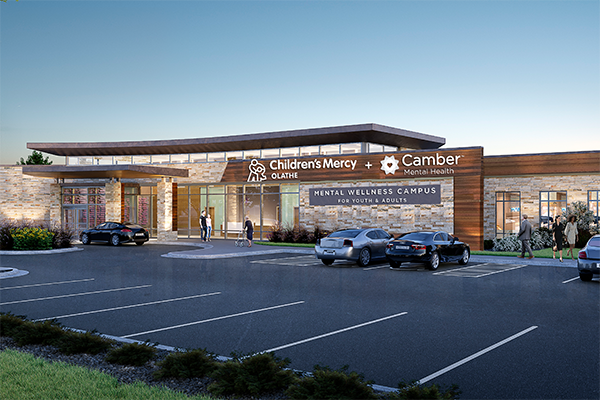Depression, Anxiety, and ADHD in Children—How You Can Make a Difference

October is Mental Health Awareness Month, and an important time to share mental health education to create awareness about the challenges children of all ages can experience and how to help them. Addressing mental health concerns timely and effectively is critical for the short and long-term health of kids and teens who are struggling.
Mental health is a substantial aspect of a child’s overall health and wellbeing because it can involve mental, emotional, behavioral and physical components—meaning it has a large impact on how kids feel, think and behave.
A mental health disorder in a young person can affect the way they learn, act or handle emotions. These challenges can cause stress, pain, and problems throughout all areas of their life from in the home, at school, developing healthy relationships, self-esteem and more.
Why is mental health awareness so important for our youth? What should you be watching out for? Learn more in this blog!
Looking for a fulfilling career making a difference in children’s lives? Check out our career opportunities!
The State of Mental Health in Young People Today

Today’s youth experience a number of challenges unfamiliar to generations before. From social media pressures to pandemic stressors, enhanced fears of school shootings and more, children may be feeling overwhelming emotions that can create toxic levels of stress and worry.
Research shows that mental health crises are increasing among youth. According to the CDC, from March 2020 to October 2020, mental health-related emergency department visits increased by 24% for children ages 5 to 11 and 31% for those ages 12 to 17.
What is the state of mental health in young people today? These mental health statistics can give you a better understanding of what a child may be facing:
- One in 20 children experiences attention deficit hyperactivity disorder (ADHD). Boys are three to four times more likely to be diagnosed with ADHD than girls.
- 15% Of youth (ages 12-17) report at least one major depressive episode in the past year.
- 10.6% Of children (or over 2.5 million youth) cope with severe major depression.
- The number of youth experiencing severe major depression increased by 197,000 from 2021 to 2022.
- Up to 33% of the 3.4 million youth with depression in the U.S. may actually be experiencing early-onset bipolar disorder.
- Suicide is the second leading cause of death among individuals between the ages of 10 and 34.
Gaining awareness of the risks of mental health conditions is one way caregivers can help better support the children in their lives and provide a nurturing, compassionate environment.
Common Mental Health Challenges Among Children
The CDC reports that anxiety, behavioral problems, depression, and ADHD in children are the most commonly diagnosed mental disorders in the United States. Caregivers can support the youth around them by learning more about the signs and symptoms of these mental health challenges and preparing themselves to take action if needed.
ADHD
ADHD is a common neurodevelopmental disorder that affects people’s behavior. It can cause them to be hyperactive and struggle with acting on impulses. Signs and symptoms of ADHD in children can include having a short attention span, failure to follow instructions or complete tasks, constant fidgeting, or impatience, among others. ADHD looks different in everyone and children and teens may display a range of symptoms at differing levels of severity.
If you’re concerned that a child in your care is struggling with ADHD, a good first step is to talk with their primary physician so they can do a professional assessment.
If a child is diagnosed with ADHD, here are some ways you can help them:
- Keeping a consistent routine every day.
- Keep everyday items well organized so that each item has a specific place where they can always find it.
- Remain clear and consistent when giving directions, rules or other guidance.
- Give praise or rewards when rules or directions are well followed.
- Join a training for parents/caregivers to learn skills for managing difficult behaviors in children.
- Work closely with the child’s teachers and school guidance counselors to ensure everyone knows how to best support the child.
Anxiety
Everyone experiences some anxiety from time to time but when those feelings become so big that they are difficult to manage, it might be a sign of an anxiety disorder. Instant feelings of fear, terror or worry can occur quickly and make it a challenge to cope. When left untreated, anxiety gets worse over time and it doesn’t go away on its own.
Signs of anxiety can include irritability, complaints of unexplainable stomach or body aches, acting out, restlessness, and several other symptoms. If you’re noticing these symptoms in a child, reach out to a licensed professional before the child experiences a crisis.
Other ways you can be supportive of a child with anxiety include:
- Staying calm in front of them, they are observing how you react to the situation
- Helping them learn skills for coping and problem-solving
- Help them find soothing techniques such as activities like yoga, meditation or deep breathing
- Don’t encourage them to avoid the situations, people, places or things that give them anxiety because while it could temporarily make them feel better, it will cause the anxiety around those fears to grow larger
If you are seeing signs of anxiety in a child, reach out to their primary physician, local community mental health center, or a licensed therapist for a professional evaluation.
Watch the video below for more information about anxiety in youth.
Check out this video with Spanish subtitles here.
Depression
We all experience times in our lives when we feel sad but when these feelings grow so strong that they feel unmanageable or last for long periods of time, the person experiencing them might be struggling with depression. Signs and symptoms of depression can include feelings of hopelessness, changes in eating or sleeping habits, lack of interest in activities someone once enjoyed, and other drastic changes in someone’s mood or behavior.
If a child is showing signs of depression, it’s critical to see a doctor or licensed therapist quickly to receive a professional assessment. They can then develop a treatment plan tailored to the child’s individual needs. Your local community mental health center can also be a helpful resource for finding treatment. You can also help the child complete this free assessment to determine if they might be experiencing depression and be sure to follow it up with an evaluation from a licensed professional. If a child is struggling with depression, speak with their teachers and school counselors to ensure they know that the child may need additional support at school.
If a child expresses thoughts of suicide, call 911 or the Suicide and Crisis Lifeline at 988. Take any signs of suicidal ideation or statements about suicide very seriously and get them professional help as soon as possible. Depression will not go away on its own.
Watch the video below for more information about depression in youth.
Check out this video with Spanish subtitles here.
What You Can Do to Support Youth Mental Health
As a consistent presence in a child’s life, you have the chance to make a positive impact on their mental health. In addition to learning about mental health conditions, you can teach them skills that will help them take care of themselves, such as:
- Role modeling mental self-care. As an adult, one of the best ways to teach anything is to role model it yourself. Show children how to use healthy coping skills to work through problems and display good self-esteem.
- Facilitate healthy relationships. Having strong relationships is important to start in childhood and it impacts life-long wellbeing. Do what you can to help your child build positive relationships by encouraging their involvement in activities they enjoy and by modeling healthy relationships in your own life.
- Create a safe, positive home space. Having a peaceful home life offers a much-needed respite for children and teens. Become aware of your child’s media use at home. Make time for family activities. Doing these things can make a big difference and encourage children to open up to you if they are having trouble.
- Work on building resilience. Being able to work through life’s ups and downs can help improve mental health. You can prepare your child to make it through hard times by teaching them emotional resilience by helping them achieve goals, nurture a positive self-view and accept change.
Be an advocate for those you love and you can make a tremendous difference in their lives.
Find Support with Camber Children’s Mental Health
Camber is the leading regional provider of children’s mental health services with a network of nonprofit hospitals and residential treatment centers in Kansas City, Wichita and Hays. As the pioneer of trauma-informed mental healthcare models in the region, Camber has spent over 30 years developing and enhancing innovative therapies to help thousands of children live more balanced, healthy and resilient lives.
We support youth experiencing a number of mental health conditions, including:
- ADHD
- Aggression
- Anxiety
- Autism Spectrum Disorder
- Bipolar Disorder
- Depression
- Disruptive Behavior Disorders
- Disruptive Mood Dysregulation
- Obsessive Compulsive Disorder
- Post-Traumatic Stress Disorder
- Self-Harming
- Substance-Use Disorder
- Suicide Prevention
Our team is expertly trained in helping families navigate the mental health treatment process, including identifying the type of treatment that can best support each child.





